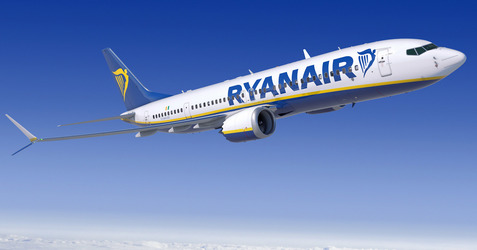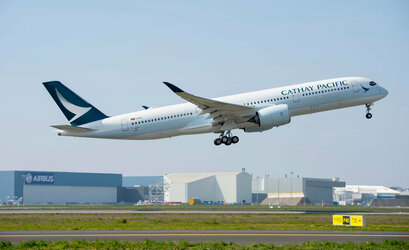Shaping policies and initiatives that deepen and enhance the attractiveness of investing in this highly specialised corner of the financial services sector should be a priority for any Government or political thinktank. In that context this article advocates for an energetic approach by Ireland to further its global leadership of the aircraft leasing industry, a position attained from decades of innovative partnership between the public and private sectors.

Joe Gill
The leasing of commercial aircraft is a complex and specialised financial service which encompasses a multitude of disciplines. Engineers, marketeers, accountants, lawyers and bankers form the backbone of a sector that has grown in importance for the global air travel industry during the past forty years. Working with expensive assets (a single narrow body aircraft can be worth up to $100m) the air finance eco-system provides extensive legal, regulatory and financing structures that ensure these assets can be deployed on behalf of investors with airlines across the world in numerous jurisdictions. An efficient and reliable legal and funding framework helps to ensure the cost of leasing is kept competitive for aircraft operators of all types, ranging from the blue-chips flag carriers like American Airlines, Lufthansa, Ryanair and Southwest, to start up airlines in high growth developing nations across Asia, Africa and Latin America. Successful leasing companies have management teams and advisory syndicates that help deliver these outcomes in a highly volatile and fast changing environment. This is where Ireland has developed a world class reputation.
Air travel is a long term growth sector across the global economy. It also forms a key strategic element in the GDP of economies worldwide. For example air travel accounts for over 3% of the Asia-Pacific economy, 5% of North American GDP and 4.4% of European GDP. It is expanding at a material rate which in turn is creating demand for more commercial airplanes. Airbus estimates that the global commercial aircraft fleet will rise from about 23,000 aircraft in 2020 to over 46,500 by 2042. This will occur while air travel demand increases by an average of 3.6% each year. That latter estimate for the fleet will include almost 24000 aircraft for growth, and over 17000 to replace retired equipment. Within that larger fleet by 2042 80% of new deliveries will comprise single aisle narrowbody aircraft and 20% will be widebodies. Airbus also expects the freighter fleet to grow from 2000 units in 2020 to over 3200 by 2042, further expanding the market opportunity for financiers and lessors of aviation assets.
There are in excess of forty aircraft leasing platforms managed and led from Ireland. Each of these has banking, legal, engineering, marketing and administrative needs, most of which are provided in Ireland supporting businesses that are by definition global in nature. These compete to win business from investors and aircraft operators around the world. Growth is fuelled by expanding economies, rising population numbers and an increased demand for air travel for leisure and work. About 5000 airlines compete for this business and many of these choose to lease instead of own aircraft as part of their strategic planning. About 50% of the global fleet is now leased. Fleets are evolving for many reasons. Some carriers are simply growing, others are working older aircraft out of their fleets and all are operating under a growing demand for air travel that is less damaging to the environment in which it operates. This latter point is creating enormous challenges but opportunity too for the aircraft leasing sector.

"Ireland can plant a flag in the world of air finance that compliments and strengthens its current reputation for hosting the aircraft leasing industry".
Sustainable air travel is a key challenge for the entire aviation industry over coming decades. Major steps have been achieved with new technology aircraft regarding noise and fuel emissions by manufacturers including Airbus and Boeing. Lessor order books are being filled with these types of planes that will underpin the move by airlines towards a more sustainable future. In 2022, for example, 25% of the in service fleet is composed of new generation aircraft compared to 5% in 2017 and this share is expected to grow quickly. The inclusion of sustainable aviation fuel (SAF) in increasing quantities will support these changes and further encourage airline and aircraft investors to support an entire transition to new technology airplanes. This creates a lot of opportunity for lessors that can deploy capital and provide aircraft to a wide variety of airlines.
Beyond this current crop of new tech aircraft is an entirely more revolutionary prospect. Large amounts of R&D capital are being expended to design new propulsion units that sharply reduce or remove completely fossil fuel emissions from commercial aircraft. While there engine types are not yet close to commercial utilisation they are seen by thought leaders and politicians as the key to approving a significant further increase in air travel over coming decades.
This is where Ireland can plant a flag in the world of air finance that compliments and strengthens its current reputation for hosting the aircraft leasing industry. By deploying a set of policies and initiatives that support the ongoing fight to invent pollution free aircraft Ireland can underpin its credentials as an innovator in the aviation finance world.
Key steps that could advance the interests of both the air finance sector and Ireland are;
1. Support the development of a “Sustainable Aviation Campus” that embraces third level institutions, innovators and entrepreneurs to advance a range of propulsion and aerodynamic solutions which help accelerate pollution free flying. Shannon airport is an ideal location for this given its aviation history and space to facilitate and host a variety of activities.
2. The Irish Government should host an annual global conference focussed entirely on “Pollution Free Aviation” which brings together financiers and the aviation industry to debate pertinent issues and create networking opportunities for those engaged in sustainable flight.
3. The aircraft leasing community, airlines and airports should be encouraged to adopt policies that provide world leading roadmaps and solutions to sustainable aviation. In each of these sub-sectors there is scope to make the Irish aviation sector a standard bearer for initiatives that drive down emissions across the aviation complex.
If Ireland positions itself as a leading global beacon for sustainable air travel it will provide the platform on which air finance companies can leverage their balance sheets and skill sets in a way that helps transform air travel around the world to meet the growing and exacting standards being set by regulators and Governments for aviation.

A pool of executives who have a deep understanding of the aircraft financing environment with skills in financing, marketing and administration of aircraft on behalf of investors and airlines.
Aircraft leasing and aviation finance is a financial services specialism that is coveted by many Governments worldwide because of its multiplier effect across employment and earnings. This explains why jurisdictions including Hong Kong, Singapore, Amsterdam, the Gulf States and New York strive to attract companies and investors engaged in air finance. Attractive employee and corporate tax rates alongside supportive civil services are deployed to entice companies to locate in these centres.
Ireland has forged a world leading position in air finance through a diligent focus on building a credible legal and accounting infrastructure that supports the ownership and leasing of commercial airplanes across the world. Through a variety of international tax agreements and adherence to recognised legal frameworks, particularly the Cape Town Treaty, Ireland has won a reputation as a reliable and consistent jurisdiction for these long life high value assets. Complimenting that is a pool of executives who have a deep understanding of the aircraft financing environment with skills in financing, marketing and administration of aircraft on behalf of investors and airlines.
Over recent years significant changes in the ownership of the aircraft leasing industry has occurred as private equity, stockmarket listed companies, sovereign wealth funds and state owned entities have invested and divested platforms focussed on the leasing of aircraft. That dynamic activity has created opportunities for cadres of executives to hold senior positions in a variety of corporations and driven entrepreneurial zeal through the eco-system. Despite regular changes in ownership structures the management teams that lead the industry have continued to be weighted heavily in Ireland and this is a key asset in shaping the future of the industry from an Irish perspective.
Behind the leasing companies large accounting, legal and investment banking service providers have formed specialist teams of advisers to work in conjunction with these leasing companies to further their growth ambitions. Many of these too are located in the Republic. By fostering and encouraging such activity the Irish Government and its civil service can support the ongoing success of this sector and help retain and expand Ireland’s role in this growth segment of the financial services industry.
Intertwined with this debate is a broader discussion about air travel and the environment. A school of thought, evident in certain political circles, suggests a sharp reduction in flying is a short-term solution to the climate change challenge. However, Ireland as an island nation and being a small open economy, relies more than most countries worldwide on air travel. Tourism, trade and migration are all hallmarks of the Irish economy that are inextricably linked to air travel and high levels of employment. Instead of calls for less flying the focus should be on transitioning air travel towards a genuinely sustainable future.
This conflation of the needs of the Irish economy and its air finance industry warrant a more nuanced conversation. That should deliver a strategic roadmap that provides growth for the Irish economy alongside a thriving aircraft leasing community which at its core is providing equipment that decarbonises air travel. That is a lofty ambition but one that is required if the aircraft leasing sector in Ireland is to continue its important role as a global leader.
